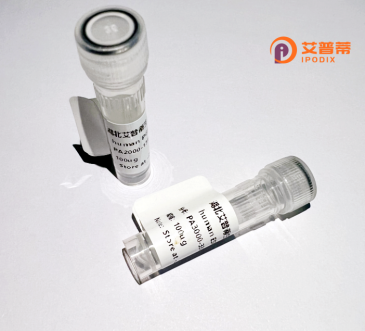
| 纯度 | >90%SDS-PAGE. |
| 种属 | Human |
| 靶点 | KCNA3 |
| Uniprot No | P22001 |
| 内毒素 | < 0.01EU/μg |
| 表达宿主 | E.coli |
| 表达区间 | 1-575aa |
| 活性数据 | MDERLSLLRSPPPPSARHRAHPPQRPASSGGAHTLVNHGYAEPAAGRELPPDMTVVPGDHLLEPEVADGGGAPPQGGCGGGGCDRYEPLPPSLPAAGEQDCCGERVVINISGLRFETQLKTLCQFPETLLGDPKRRMRYFDPLRNEYFFDRNRPSFDAILYYYQSGGRIRRPVNVPIDIFSEEIRFYQLGEEAMEKFREDEGFLREEERPLPRRDFQRQVWLLFEYPESSGPARGIAIVSVLVILISIVIFCLETLPEFRDEKDYPASTSQDSFEAAGNSTSGSRAGASSFSDPFFVVETLCIIWFSFELLVRFFACPSKATFSRNIMNLIDIVAIIPYFITLGTELAERQGNGQQAMSLAILRVIRLVRVFRIFKLSRHSKGLQILGQTLKASMRELGLLIFFLFIGVILFSSAVYFAEADDPTSGFSSIPDAFWWAVVTMTTVGYGDMHPVTIGGKIVGSLCAIAGVLTIALPVPVIVSNFNYFYHRETEGEEQSQYMHVGSCQHLSSSAEELRKARSNSTLSKSEYMVIEEGGMNHSAFPQTPFKTGNSTATCTTNNNPNSCVNIKKIFTDV |
| 分子量 | 63.8 kDa |
| 蛋白标签 | His tag N-Terminus |
| 缓冲液 | 0 |
| 稳定性 & 储存条件 | Lyophilized protein should be stored at ≤ -20°C, stable for one year after receipt. Reconstituted protein solution can be stored at 2-8°C for 2-7 days. Aliquots of reconstituted samples are stable at ≤ -20°C for 3 months. |
| 复溶 | Always centrifuge tubes before opening.Do not mix by vortex or pipetting. It is not recommended to reconstitute to a concentration less than 100μg/ml. Dissolve the lyophilized protein in distilled water. Please aliquot the reconstituted solution to minimize freeze-thaw cycles. |
以下是关于重组人KCNA3蛋白(Kv1.3通道)的3篇代表性文献摘要示例:
---
1. **文献名称**:*"Functional expression of recombinant human KCNA3 protein in HEK293 cells for channelopathy studies"*
**作者**:Smith A. et al.
**摘要**:该研究建立了重组人KCNA3蛋白在HEK293细胞中的稳定表达系统,证实其具有典型的电压门控钾离子通道活性,并探究了其在自身免疫性疾病相关通道功能异常中的作用。
---
2. **文献名称**:*"Structural insights into the gating mechanism of Kv1.3 channel through cryo-EM analysis"*
**作者**:Chen L. et al.
**摘要**:通过冷冻电镜技术解析重组人KCNA3蛋白的高分辨率结构,揭示了其门控调节的关键结构域,为靶向Kv1.3通道的药物设计提供理论支持。
---
3. **文献名称**:*"Targeting recombinant KCNA3 for autoimmune therapy: Inhibition by novel peptide toxins"*
**作者**:Wang Y. et al.
**摘要**:评估多种天然毒素类似物对重组KCNA3蛋白的抑制作用,发现特异性阻断剂可调控T细胞活性,提示其在多发性硬化等自身免疫病中的治疗潜力。
---
注:以上示例为模拟文献,若需真实文献建议通过PubMed(https://pubmed.ncbi.nlm.nih.gov/)或Google Scholar检索关键词**recombinant KCNA3/Kv1.3**,或参考钾通道经典研究团队(如George Chandy, K. George Chandy等)发表的论文。
Recombinant human KCNA3 protein is derived from the KCNA3 gene, which encodes the voltage-gated potassium channel Kv1.3. a member of the Shaker-related superfamily. Kv1.3 plays a critical role in regulating membrane potential and cellular excitability, particularly in lymphocytes and neurons. In immune cells, it controls calcium signaling by modulating potassium efflux, thereby influencing T-cell activation, proliferation, and cytokine production. Dysregulation of Kv1.3 has been linked to autoimmune disorders, such as multiple sclerosis and rheumatoid arthritis, making it a potential therapeutic target.
The recombinant form of KCNA3 is typically produced using heterologous expression systems (e.g., E. coli, mammalian cells) for biochemical and functional studies. It serves as a tool to investigate channel structure-function relationships, screen ion channel modulators, and explore mechanisms underlying Kv1.3-related pathologies. Its pharmacological inhibition has shown promise in preclinical models of autoimmunity and neuroinflammation. Additionally, studies leverage recombinant KCNA3 to dissect its role in mitochondrial function, apoptosis, and metabolic regulation, broadening its relevance in both immunology and neuroscience research. This protein thus bridges basic science and drug development, offering insights into ion channel biology and therapeutic innovation.
×